Falilat Ogunkoya won Nigeria’s first individual medal in track and field at the Olympics courtesy her efforts in the 400m which fetched a bronze medal and a 49.10 seconds African record. She also made history as the first and so far only Nigerian in all events to win two medals at the same edition of the games following the incredible, 3:21.04 seconds African record-setting feat the 4x400m team she anchored to a silver medal finish achieved at the Games.
Coach Tony Osheku, arguably one of the most successful coaches Nigeria has ever had tells the story to Complete Sports’ DARE ESAN, of the making of a double Olympic medallist, how he got Ogunkoya back to the track after quitting in 1990.
Here is Osheku’s account of how it all began.
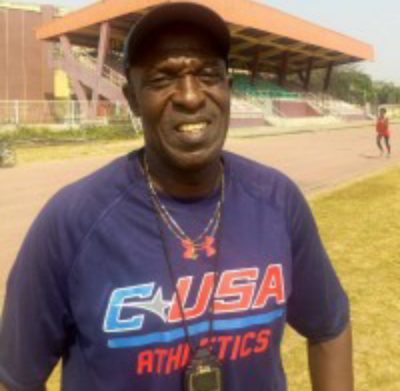
Twenty- six years ago I started my coaching career in Albuquerque, New-Mexico,USA. Initially, I didn’t consider myself as a coach, I considered myself as a teacher and motivator.
I already graduated with a Masters Degree in Sports Administration and I was on my way to join the USA Air Force. I passed one of the examinations already but to my surprise I ended up being a coach and was privileged to start my coaching career by training future Olympics medallist..Falilat Ogunkoya.
She had our baby in 1993 in Starkville, Mississippi and in 1994 she moved to Albuquerque to train with me. We had an agreement that she must return to track and field after quitting in 1990.
She started with long runs on grass. Most of the times I was baby sitting while she was doing her training. After less than six months of light training, I entered her in a local competition with the high school boys and I was surprised she ran 53 seconds.
It was a positive signal for me and I quickly put a call through to Gabriel Okon who was also resident in Albuquerque at the time. Okon was also surprised and I told him to come and watch her in another competition at the end of the week. We were at the stand a week later and Fali ran 23 seconds in the 200m.
Also Read – Bonfrere: Atlanta ’96 Gold My Biggest Achievement, But I Haven’t Received My Medal
We were surprised and impressed with her performance. When we got home I sat her down and asked her if she was really interested in track and field and she said yes. Then we both agreed to take our son (Junior) to my parents in Nigeria. From Nigeria she moved to Europe to run in a few meetings.
Honestly, running 23 and 53 seconds gave me the confidence that she could make a successful comeback. We resumed heavy training in preparation for the 1995 season. She ran few meets in the United States and in April she went to compete in Houston,Texas and she improved to 51.67 seconds to place second and that really gave me the needed boost to continue with the comeback plan. When I sent the 51.67 seconds result to Athletics Federation of Nigeria, AFN, officials, I was told that a couple of officials didn’t believe she could run that fast in her comeback year.
We came home for the (1995) IAAF World Championships Trials in Lagos where she broke 52 seconds again to place second behind Bisi Afolabi who ran 51.51 seconds to win.
After the event in Lagos,those who doubted the 51.67 seconds she ran in Houston that April started believing she was indeed on her way back.
At this point, I started reading a lot of books on coaching and on track and field. I started attending track and field seminars. I was asking top athletes and top coaches questions.
I thought about getting in touch with Lee Evans, the 1968 Olympics gold medalist and the first man to run 43 seconds in the 400m. He coached in Nigeria in the 1970s and he also coached in many African countries. I asked him a lot of questions and he responded well. He advised me a lot on coaching and also how to run the 400m. I bought a lot of books including Clyde Hart’s (Michael Johnson’s coach) book to learn a few tricks about coaching at the highest level.
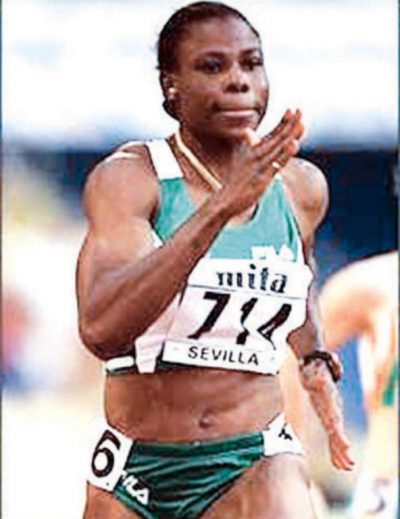
After the trials in Lagos where Falilat placed second in the 400m, she got a Spanish manager by the name Alonzo. She stayed in Spain for a while and ran in some meets.
My plan was to go back to Albuquerque after the trials. A couple of days before my departure to the USA, Okon called me from Spain and he told me that Fali just ran a PB of 50.7. He advised me to proceed to Spain and forget about going back to the States.
Few days later I was in Spain and from there we flew to Gothenburg, Sweden for the World Championships. Olapade Adeniken really helped a lot introducing me top stars and taught me a lot about managers/agents. Lee Evans was there with the Saudi Arabian team as their
coach. He introduced me to John Smith and some other top athletes.
Falilat made it to the final with her compatriot (Fatimah Yusuf). In the final she placed 6th behind Fatimah with 50.77. She got injured thereafter and couldn’t run in
some meets in Europe after the championships.
We decided to come to Nigeria to prepare for the African Games in Harare, Zimbabwe. In Harare,Fatimah won the 400m with a new African record of 49.43 seconds. Fali was second with a personal best of 50.31 seconds.
The 50.31 seconds run gave me hope that we were getting there and it motivated me for the upcoming Olympics the following year in Atlanta, Georgia, USA. Also knowing that we have to qualify first by competing against tough competitors at the Nigeria trial, we decided to train twice daily. When I found out that the 400m runners would be running four rounds at the Games in Atlanta,I decided to work more on Fali’s endurance and also encouraged her to run the 800m in some competitions in the USA before our trials.
I also dreamt that the Nigerian Women’s 4×400 won a medal at the Olympics and I encouraged Airat Bakare to resume training. Airat was a former National record holder in the 400m. She couldn’t come back to the track as a result of her tight schedule.
That year (1996), Fali started her first competition in January in Sindelfingen,Germany and she won with 53.53 seconds in an indoor meet.In her second meet she was defeated by her compatriot, Afolabi and that defeat really made her to double her efforts in training when she returned to the USA.
While in Europe she also paced (Maria) Mutola in a meet where she ran the 500m in an 800m race that Mutola won. We used this for our strength training. When Falilat returned to the USA after her indoor season in Europe,she resumed training the next day.
On May 4th she won a Grand Prix meeting in Rio De Janeiro, Brazil in 50.69 seconds. My friend who watched the race called me and said Fali looked good. On May 24th while in Oregon,USA for a Grand Prix race,I got the bad news that Falilat lost her Mother.This was devastating and I didn’t know how to explain it to her.
She competed on the 26th of May and placed second with 51.0 seconds. When she got home I didn’t know how to explain to her. Fortunately for me, Lee Evans was in Albuquerque with his team. He spoke to her on the phone and asked her to train the next day. That night when I told her the bad news I was surprised that she handled it well. The next day she ran a fast 500m and she did well. Falilat did a workout in May and she did her PB in 350m with a time of 42 seconds, this was when I started having the belief and the confidence that she could get to the final in Atlanta and probably make the podium. In June we were in Lagos for the Olympics trials and she surprised a lot of people when she won the trials, running a hand-timed 49.9 seconds.Not many reckoned with that performance but it was good enough for the selectors to include me among the coaching crew to the games.
Few days later she flew to Paris with Olapade Adeniken and on the 28th of June she placed second at the Paris Grand Prix with personal best of 49.89 seconds, her first sub-50 in the 400m!.
On July 3rd at the Grand Prix in Lausanne, Switzerland she placed second running another personal best- 49.60 seconds!. This arrested the attention of many people including the doubting Thomasses who never believed she could make a successful comeback to track and field even after making the final of the World Championships in Gothenburg just a year earlier.
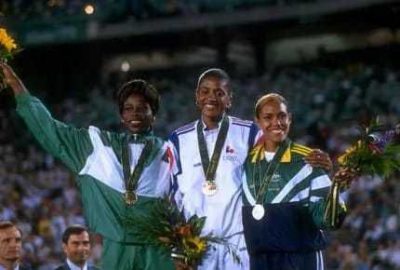
It was at this point Doctor Amos Adamu who was the Director of Sports at the Sports Ministry invited me to his office at the Tafawa Balewa Square in Lagos for a meeting. He said the Sports Ministry was ready to pay Fali the appearance money that she usually get so that she could stop competing in the circuit because they didn’t want her to burn out.
We negotiated and I flew to Nice, France to advise her to stop competing. She won the meet with 50.00 on July 10th and that was her last meet before the Olympics. We flew from Nice to our base in the USA to resume training. After the training in Albuquerque, we left for Atlanta a week later. At this point, I started talking to her about the Games,that she was ready and capable of winning a medal. I told her that her training indicated that she was ready.
Also Read – Ajunwa: How I Dumped Football And Jumped Into Olympic Gold
Our preparation at the Games Village was 90% psychology and 10% physical. I told her it was possible for her to be the first Nigerian to win the first individual medal in track and field going by the schedule and the level of competition in some other events.
She ran her first race on the 26th of July with a time of 52.65 seconds and on the 27th she ran 50.65 to qualify for the semifinal. In the semifinal the next day (July 28) she ran a new 49.57 seconds personal best to qualify for her first Olympic final!.
And on the day of the final, Monday July 29,1996 I couldn’t eat right. During the warm up I was watching (Marie-Jose ) Perec and Cathy (Freeman) on what they were doing.
Lee Evans really advised her to relax and to go out there to fight for a medal. The warm up track was far to the stadium. Egbunike asked me if I was going to the stadium mainbowl to watch the race and I said yes. I went inside and I didn’t open my eyes when the race started. I watched the replay to see her position. When I saw her position as third, I was speechless. A lot of people congratulated me. It was a good day for the Africans because Davis Kamoga of Uganda also won a bronze in the Men’s 400m.
We could not rest Fatimah and Fali for the 4x400m heats because our heat was very strong. We made them to run the heat.
Winning another silver in 4X400m was a great achievement. A friend told me that I would be rich forever with the double medals Falilat won. This was (and still is) because some countries do pay their coaches if their athletes win medals.
In Qatar they pay $250,000 to a coach if his/her athlete wins bronze medal. I was disappointed that Nigeria didn’t give me a national award, Member of the Order of the Niger,MON. But all the football coaches that won gold medal got MON. Our athletes won gold, silver and bronze and no award for the coaches. The athletes got MON, land and other stuff. I only got a Chieftaincy title in Ogun State which I really, really cherish till today…but unfair that coaches who did well to achieve Nigeria’s best showing at the Olympics were completely ignored.
Falilat started the season in January and finished in middle of September in Tokyo, Japan. What a season !!!. She ran sub-50 seconds seven times in 1996.
Got what it Takes?
Predict and Win Millions Now






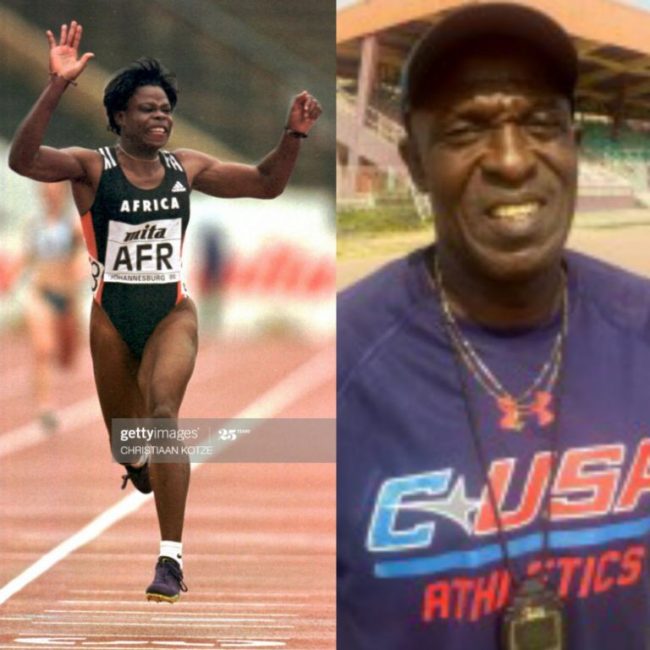
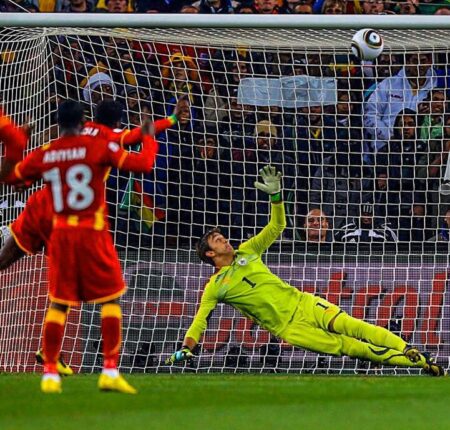
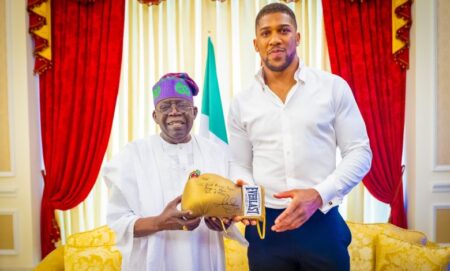
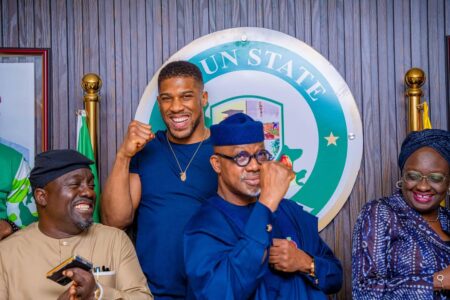



1 Comment
Great men and women of Athletics in the 90’s, especially Atlanta 96. I remember Onyali, Ezinwa brothers, Falilat Ogunkoya, Olapade Adanekan, Chidi Imo ,e.t.c.
How did will fall. Jamaica was no where in Athletics at this time. Just an ageing sprinter called Marlene Otey.
But while their sports administrators went to the drawing board to plan and prepare for the next decade, our own administrators stopped doing the little they were doing. And just went to sleep, thinking that, hardwork and planning was not necessary for success. Even the last Sports minister said on national TV, that you don’t need hardwork or preparation to win an Olympic medal, that all was needed was success mentality. No wonder he failed woefully as a minister.
I just pray that God use the present Sports minister and administrators to return Nigeria to its glory days in Athletics